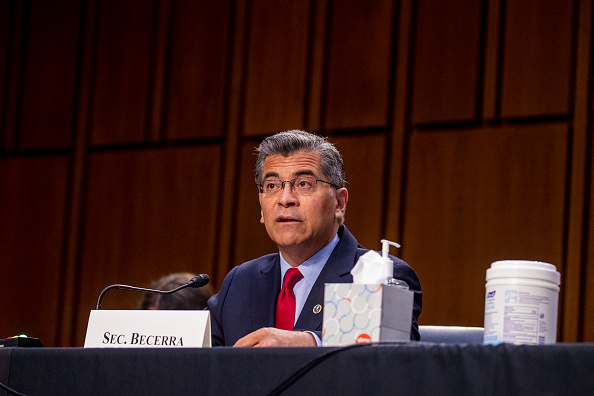Health and Human Services Secretary Xavier Becerra defended a wide range of White House health policies during a hearing of the House Ways and Means Committee, on March 21.
From what GOP committee members said was the administration’s flawed implementation of a bipartisan law to end surprise billing by hospitals to the White House’s proposed nursing home staffing mandate, Becerra was repeatedly confronted with allegations the Biden administration puts politics ahead of patients.
Nursing Home Staffing Rule
Under a September 2023 proposed rule, nursing homes participating in Medicare or Medicaid would be required to meet specific nurse staffing levels, including providing each resident a daily minimum of 0.55 hours of care from a registered nurse and 2.45 hours from a nurse aide, exceeding existing standards in most states.
An exchange between committee chairman Jason Smith (R-MO) and Becerra over the administration’s proposed nursing home staffing rule typified the proceedings, according to a partial transcript.
“Earlier in the month, the Committee passed legislation introduced by Representative Fishbach to block implementation of the unworkable, one-size-fits-all nursing home staffing mandate,” said Smith. “Estimates show that this rule will impose a $40.6 billion cost on nursing homes, 94 percent of which currently wouldn’t be in compliance, jeopardizing access to care for 1.2 million Americans.
“Can you commit to the Medicare beneficiaries watching this hearing that no nursing home will close and patients won’t lose access to care as a result of this rule?” Smith asked Becerra.
“I can commit to you, and I commit to each and every one of the Medicare beneficiaries that is out there, that if they need a nursing home, they will find one that offers them quality care,” said Becerra.
Will Rule Close Nursing Homes?
Because of the government mandate, the committee’s website notes, “280,000 seniors could lose their spot in a nursing home.”
Rep. Greg Murphy (R-NC), a practicing physician, also pressed Becerra on the proposed rule. “We don’t have the nurses,” said Murphy. “We have closed beds at my institution, at my medical center, because—guess what—we don’t have the nurses. I’m fine if we can work on some program to get nursing homes up to par. I believe it’s absolutely necessary, but you can’t make them out of thin air…I would urge you to postpone this until we can reasonably do this.”
Becerra asked, “Congressman, are you saying we don’t need nurses in a nursing home?”
“No, I’m not saying that at all,” said Murphy. “Please don’t try to change my words. I’m saying there are not enough nurses in this country.”
Donna Jackson, director of membership development for the Project 21 black leadership network, says the nursing home staffing rule will disproportionately affect lower-income people.
“Sadly, the Biden administration’s new requirements for nursing homes seem to be created purely for the sake of government agency growth and political grandstanding, but the costs of these mandates fall squarely on vulnerable low-income and minority communities,” Jackson told Health Care News. “Nursing home costs are already sky high, and these mandates will make things worse.”
Medical Device Silence
Shortly after taking office, the Biden administration repealed a Trump-era policy, the Medicare Coverage Innovative Technology Rule, designed to give seniors immediate access to new devices approved by the Food and Drug Administration.
Despite promising a swift replacement, no final rule from the Biden administration has been forthcoming. Asked if he could give a timeline for a replacement, Becerra said, “I wish I could give you a specific timeline…,” saying the administration’s proposal is still under review by several agencies.
Fentanyl Crisis and the Border
Fireworks also erupted over the subject of fentanyl and how the administration’s open border policies are creating an overdose crisis.
“The word ‘fentanyl’ is mentioned in President Biden’s FY 2025 HHS budget a whopping one time—one time—even though this is clearly a public health emergency,” said Rep. Kevin Hern (R-OK). “Can you tell us how you expect to curb the fentanyl deaths and help [those] struggling [with] addiction when the southern border continues to stay wide open, allowing the free flow of fentanyl into our country?”
“I can tell you what we are doing, what the president has asked us to do, and the resources given us at HHS on the health care side to deal with fentanyl,” said Becerra. “We are moving forward to try to make Naloxone and other treatments that can counteract the effects of a fentanyl overdose to keep a person alive, more available…We are continuing to make the types of services that work to keep people from dying available…”
“Wouldn’t it be better if we just stopped the flow across the southern border?” Hern asked.
Strain on Foster Care
Becerra clashed with Rep. Beth Van Duyne (R-TX) on another border-related problem, the surge of unaccompanied minors, which is putting severe strains on her state’s foster-care system and is exacerbated by the Office of Refugee Resettlement not properly vetting prospective homes.
Van Duyne “inaccurately depicted the work that we do,” Becerra said. “So, it’s hard to answer.”
“It is sadly ironic that the Biden administration HHS is dragging its feet on implementing approaches to solve today’s most urgent problems, such as the inflow in fentanyl across our porous borders, while at the same time defending fatally flawed fixes, such as the nursing home regulations,” Jeff Stier, a senior fellow at the Consumer Choice Center, told Health Care News. “Ideologically progressive policy wins out even when the outcomes are obvious failures.”
Bonner Russell Cohen, Ph.D. (bcohen@nationalcenter.org) is a senior fellow at the National Center for Public Policy Research.
